Video MGMT System
 Access Control
Access Control
Voice & Data Wiring
 Burglar Alarm
Burglar Alarm
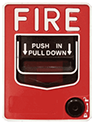 Fire Alarm
Fire Alarm
Video MGMT System
Voice & Data Wiring
THOUGHT CENTER > Blog > Alarms
August 28, 2023
No time to read? Here’s a summary:
You know the dangers of carbon monoxide (CO), but how can you ensure that your carbon monoxide alarm is working correctly?
In this blog post, we'll guide you step-by-step through the process of testing your CO alarm, discuss special testing considerations for different types of CO alarms, and explain the benefits of professional alarm installation and testing.
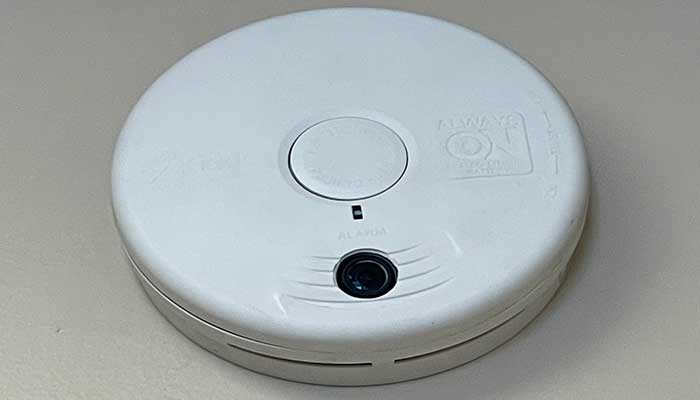
Testing carbon monoxide alarms on a monthly basis is a simple but vital task that can save lives. Here's a step-by-step guide on how to do it:
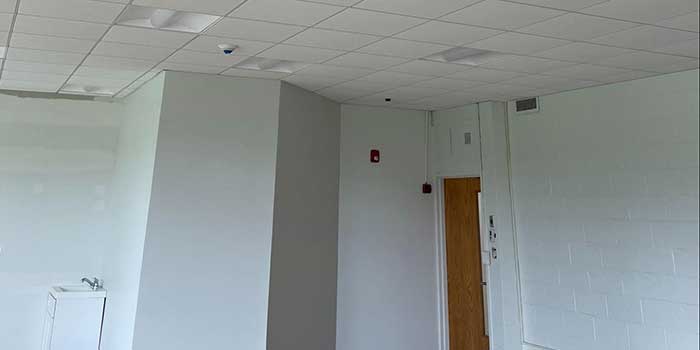
Different types of carbon monoxide alarms have unique testing procedures. Your usual manual will usually reflect the following factors in their instructions when they apply:
For these alarms, testing should include checking the battery level. If the alarm doesn't sound during testing or if it sounds weak, it's time to replace the batteries.
These alarms use low-voltage cabling to receive power and transmit data. Ensure that the power is on before testing. If the alarm doesn't sound, it may indicate a power issue or a faulty alarm.
These alarms can often be tested via a smartphone app. The app may also provide additional features, such as battery-level monitoring and alarm history.
While you can and should test your CO alarms on a regular basis (monthly, in some cases), it’s a good idea to bring in professionals for more comprehensive testing periodically.
Professional testing is more expensive than DIY testing, but it need not occur as regularly, and it offers several advantages missed by DIY tests.
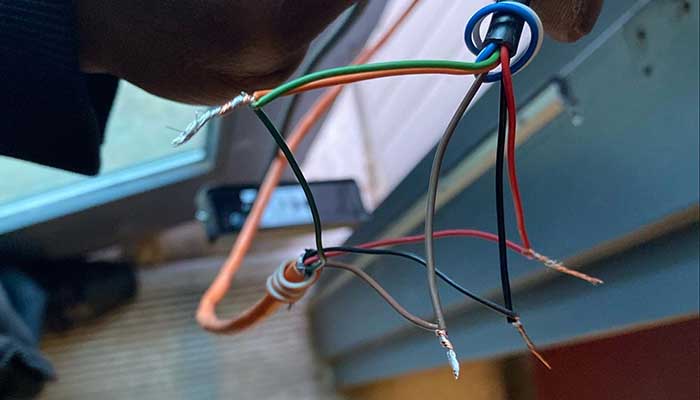
While there are numerous CO alarms available for purchase online and in big-box stores that you can install yourself, there are significant advantages to opting for a professionally installed commercial-grade CO alarm.
Commercial-grade CO alarms are designed to meet the rigorous demands of commercial environments, which often require a higher level of safety and reliability than do-it-yourself alarms and offer much better value in the long run.
These alarms are built with superior components and advanced technologies in order to provide more accurate readings and fewer false alarms than the consumer-grade DIY standard.
Expert installation matters because a CO alarm is only as good as its installation. Be sure to bring in a knowledgeable professional to assess your property and recommend the optimal number and placement of alarms.
Professional installers have the expertise to place each alarm in the optimal location for accurate CO detection. They also calibrate alarms to ensure they’re working correctly and will provide the earliest possible warning of any CO leak.
Commercial-grade CO alarms and professional security installation services comply with the latest safety standards and regulations. This compliance not only ensures the highest level of safety but can also be beneficial for insurance purposes.
Some professional installers, like those on our team at Mammoth Security, can integrate CO alarms with other security systems, such as those for fire detection, intrusion detection, video surveillance, and access control.
Integrated security systems provide much more robust security than isolated systems because integration enables different security systems to share their data with each other. It also enables users to monitor and manage all devices on a single browser, smartphone, or tablet interface.
Perhaps the most significant benefit of a professionally installed, commercial-grade CO alarm is the peace of mind it offers. Knowing that your property is protected by high-quality, correctly installed alarms allows you to rest easy knowing that nobody will be injured or die on your property as a result of faulty CO alarm installation.
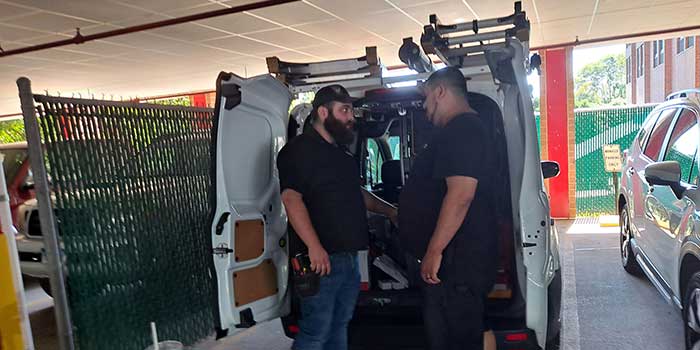
Mammoth Security provides Connecticut businesses and institutions with the best systems and technologies for life safety and asset protection anywhere in our region (and probably anywhere on the planet).
There’s a reason that Mammoth Security is quickly becoming Connecticut’s one-stop shop for commercial-grade security. In addition to CO alarms, we know security cameras, video management and storage systems, access control systems, and the structured cabling necessary for commercial-grade security and telecommunications.
You can put our knowledge and experience to work for you by filling out the simple form [below | at the bottom of this page]. We’ll soon reach out to schedule your 100% free security consultation and site survey with a friendly expert from our team.
NOT COMPLETELY SURE?
860-748-4292CO alarms are crucial in commercial properties and institutions to protect employees, customers, and visitors from the dangers of carbon monoxide poisoning, a deadly, odorless, and colorless gas.
Professional installation of CO alarms ensures optimal placement, correct calibration, and compliance with safety standards.
CO alarms in commercial properties should be tested at least once a month to ensure they’re functioning correctly. While most monthly tests can be done yourself or by your team, professionals should periodically be brought in.
Commercial-grade CO alarms offer superior performance, durability, and accuracy. Compared to do-it-yourself alarms, they’re constructed with superior materials that make them reliable.
Yes, professional installers can integrate CO alarms with other safety systems, such as fire alarms and security cameras, for a comprehensive security solution.
During professional testing, the alarm's functionality is checked, including the sound, lights, and response to CO presence. The device is also recalibrated if necessary.
If the CO alarm goes off, ensure everyone evacuates the property immediately and call the local fire department or a professional gas technician to investigate.
Yes, many regions have legal requirements for CO alarms in commercial properties. Check with your local authorities or a professional installer to understand the regulations in your area. In Connecticut, many municipalities provide their own regulations for CO alarm systems, which can usually be found online.
While the lifespan can vary, commercial-grade CO alarms typically last longer than consumer-grade alarms due to their superior build quality.
No, CO alarms are designed specifically to detect carbon monoxide but not other gasses. Other types of gas leaks require different detection devices. That said, sometimes CO sensors are included with fire and water alarms.
Commercial-grade CO alarms require regular testing and occasional recalibration.
While it's possible to install a commercial-grade CO alarm yourself, professional installation is recommended to ensure optimal placement, correct calibration, and compliance with safety standards.
Look for features like high accuracy, durability, easy maintenance, and the ability to integrate with other security systems you have currently or may have in the future.
Yes, CO can still be produced by means other than gas-burning appliances. A CO alarm is crucial to the protection of life in any modern property.